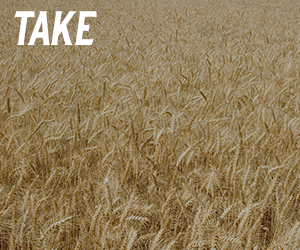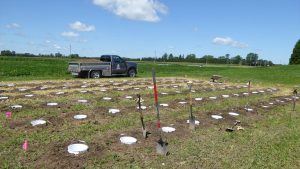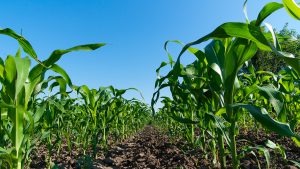Continuing the conversation
ONTARIO FARMERS OPEN UP ABOUT MENTAL HEALTH ISSUES

2017 WAS A difficult production year for farmers across Canada. Unpredictable weather was an enormous source of stress for growers; this, paired with ongoing concerns about insect, disease, and weed pressures and government regulations — many farmers experienced stress like never before.
However, farmer mental health has also taken a spotlight like never before.
Conversations are cropping up across Canada and around the world as farmers open up about their own difficulties and experiences — and they’re discovering they’re not alone in their struggle with stress, burnout, depression, and even suicide.
ONLINE DISCUSSIONS
Social media discussions have sparked conversations that cross provincial borders, helping producers talk about their concerns and stresses more openly. Opening up the conversation in the farming community is an important step in breaking down barriers.
Amy Matheson, a dairy farm raised farm advocate, and Sandi Brock, a sheep and grain farmer, touched on some of the struggles of planting in 2017 in a YouTube video they created that discusses life on the farm. Along with struggles with the weather, they also talked about some of the internal stresses that many growers were facing as a result of a difficult season.
“Sandi and I are lucky enough that people want to watch us, so spreading awareness and destigmatizing mental health was a topic we felt we should open up on to anyone who watches,” says Matheson. “The conversation is definitely changing. We need to stop pretending this isn’t happening; farmer suicide rates are among the highest for careers in the developed world, and we need people to be brave to stand up and say this is a problem. We need the same level of support from the community when someone is struggling with mental health as when there’s a physical injury or accident.”
According to Stewart Skinner, a hog farmer near Stratford, Ontario, social media has helped the farming community be more open with sharing their personal challenges – and when more people come forward, people become more comfortable in sharing their own stories and starting the conversation themselves.
In the past year, Skinner has opened up about his personal struggles with depression and mental health that started in 2012 (modernfarmer.wordpress.com). A failed farm expansion paired with a difficult year for the business triggered a dark period in his life. Skinner left the farm for a few years to gain perspective, working on a farm in Kenya and in Queen’s Park as a political advisor before returning. Skinner has shared his experience on his blog and with rural publications, as well as at the OAC Leadership conference in January 2017, and was nominated for a Centre for Addiction and Mental Health (CAMH) award for his efforts.
“In 2013, no farmers were talking about mental health — really, not a lot of people period were talking about it,” says Skinner. “Mental health services in rural areas are abysmal, and there needs to be action to improve these services and conversation. The onus is on us as farmers and as members of these rural communities to improve accessibility and build local support. As someone who has struggled with mental health, it’s important to have friends and family to talk to — we need to organize ourselves with some structure and frontline support to intervene when mental health is struggling.”
RESEARCH FOCUS
The trend towards opening up the conversation about mental health on Canadian and Ontario farms is prompting researchers to create tools that producers can use in times of mental distress.
Dr. Andria Jones Bitton, and Briana Hagen, a University of Guelph Ph.D. student, now have phase two of their research project that’s investigating mental health and wellness in farmers underway. Based on Jones-Bitton’s recognition of a need for a specialized agriculture-focused mental health resource, the first phase of the study was a survey to provide some baseline data on mental health and wellness outcomes — to assess the prevalence of mental health and wellness issues in the agricultural community and evaluate attitudes towards mental health resources in the agricultural community, to which she received an overwhelming response of over 1,100 respondents.
The second phase of the project will analyze that data and expand by conducting a qualitative study. Focusing in on Ontario farmers, Hagen will interview producers one-on-one to investigate what mental health and wellness means to producers, and specific factors are associated with stress, depression, anxiety, burnout, and resilience.
“The one-on-one interviews aim to get more detail on how people experience mental health on the farm — what goes wrong, who do they talk to, what they can do, and how we can improve their experience,” says Hagen. “We’ve had an absolutely overwhelming response to the project. People are excited it’s happening and want to make sure their community is served. Originally, we had a goal to interview 75 people — within one week of putting out a call for respondents, we had 50 people interested.”
The ball has been rolling on increasing the conversation around mental health in agriculture, says Hagen. People are bringing it up and talking about it more — and they want to keep that momentum going.
“Farmers are experiencing mental health and wellness issues at an alarmingly high rate,” says Hagen. “The resource that will be developed from the project needs to be accessible and usable, so that people can relate to it, and it can be effective. The resources that exist aren’t always relatable or accessible for farmers — agriculture is unique because it encompasses work, home, family, lifestyle, and a way of life, and brings about specific stresses — we need something that is developed and delivered in a way that is mindful of that uniqueness.”
For more information on mental health awareness, visit www.camh.ca. •

























